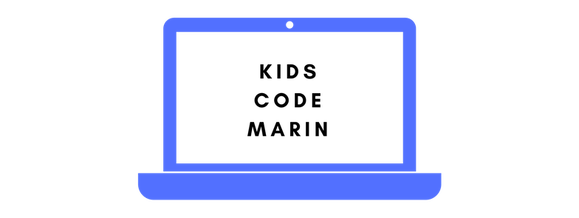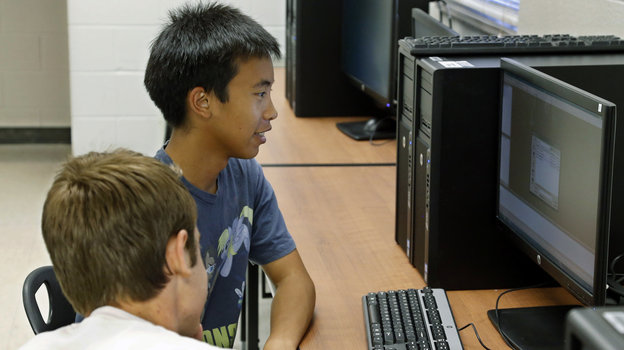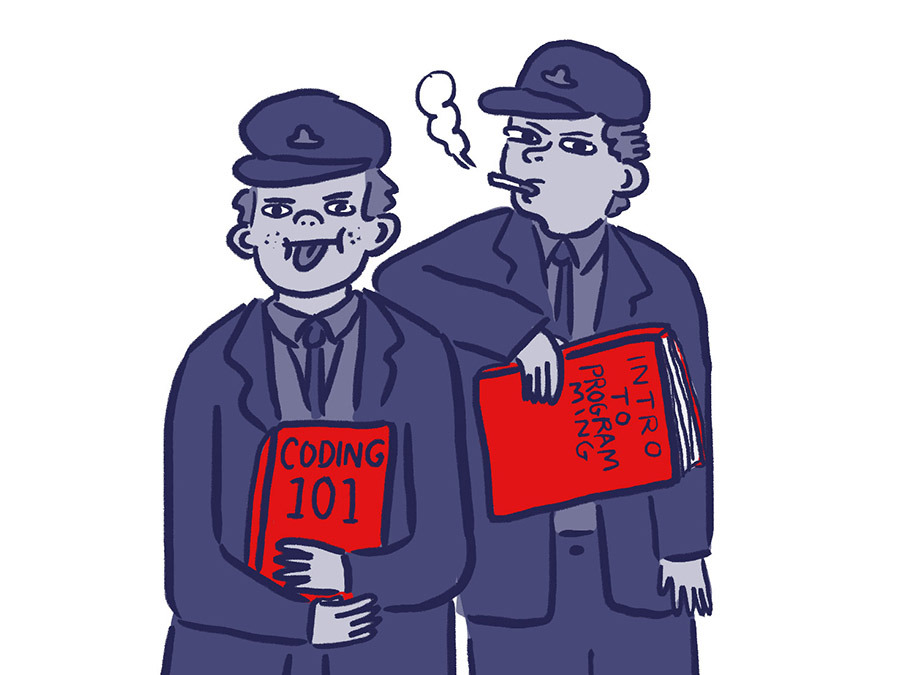Question:
I know this doesn't pertain to help with coding, but I needed to ask this question in a sub where I can get productive answers from a lot of experienced programmers.
I'm still in high school and over the last couple of days I've been really trying to find a career that I want to solidify as my goal to reach. I've bounced back and fourth between a couple professions that I've had in mind, but ultimately I wanted to choose something that I would enjoy. I'm a nerd whose always been deeply interested with computers a technology since I was a kid. People might say that I've got plenty of time to choose, and that most people don't even have a major set in college when they first enroll, but this is something I'd like to set my eyes on early.
So what is there to programming? What's the gist of everyday life for you? How rigorous was school? Did you find learning code difficult? How much would you say you enjoy your job (if you do programming professionally)? In general, I really just want you to try and convince my why programming is the way to go. I'd love to see some perspective.
Edit: I've been reading all the responses. Thank you to everyone that chimed in! It's hard to reply to everyone without saying the same thing. You guys have really changed my outlook on programming. I'm still not sure if it's for me though. I'm glad you all love your jobs. I will definitely try my hand at learning code in my spare time. Thanks once again, and if you've come upon this thread late, I don't mind seeing more points of view on the subject!
Answer:
I love programming because it is incredibly empowering. Learning programming takes a love of learning, and great curiosity. You ask why things work, and by learning how a system works, you learn how to manipulate the system. And suddenly, you're the one in control. You're no longer a helpless victim of the computer, forced to just deal with it when something isn't to your liking. If you wish something was different, if you wish some app or program existed, you can MAKE it exist. You can go out and MAKE things happen. You are god.
To truly love programming, you need insatiable curiosity, creativity, and two beliefs: that failure is exciting, and that nothing is impossible. Curiosity is what will drive you to want to learn more about HOW and WHY things work - which is essential, because before you can manipulate a computer system, you must understand it. Creativity will allow you to come up with NEW things, it's what makes you the innovator. Programmers don't just solve problems - we solve problems by CREATING. Programming is a creative act.
Finally, I'd like to share a quote by Lord Kelvin - "When face to face with a difficulty, you are up against a discovery." Programming, more than the average hobby I think, consists of near-constant failure. To not let this be discouraging, you have to really adopt an attitude where every failure is EXCITING, because it means you are on the verge of discovery - of learning something new - something that will change your understanding of this system, the way you see the world. This attitude, combined with a belief that nothing is impossible, will drive you to finish your projects and really try things that no one has tried before.
And that, I think, is why I love programming. It's challenging, yes, but I am learning every day, and also getting to make things that people might enjoy or use! The end result of this skill is just so empowering - you can come up with an idea, some wild idea, and MAKE IT HAPPEN.
I'm currently a Computer Science major in college, so I haven't started coding as a job yet. As with all jobs, I've heard it isn't as enjoyable as just doing it as a hobby. However, it's one of the most high-paying jobs there is, which is a huge plus.
Currently, classes at my school (Carnegie Mellon) are TOUGH. They are extremely rigorous and hard, but this is also the premier undergraduate CS program in the world, so that is to be expected. I honestly think the rigor of the school depends a lot on the school, and, while you can benefit from going to a more rigorous school, programming is one of those skill-based industries where you can get a job as long as you're good at it - regardless of your schooling. Formal schooling definitely helps, though, of course!
Learning code, in general, can be a frustrating experience. Coding in general is mostly time spent debugging, which can also be very frustrating. The best way to find out if coding's right for you is to try to do it. It's definitely something you can teach yourself by learning from online tutorials, for instance, so try it out and see if it's something you enjoy. Good luck and hope this helps!
I know this doesn't pertain to help with coding, but I needed to ask this question in a sub where I can get productive answers from a lot of experienced programmers.
I'm still in high school and over the last couple of days I've been really trying to find a career that I want to solidify as my goal to reach. I've bounced back and fourth between a couple professions that I've had in mind, but ultimately I wanted to choose something that I would enjoy. I'm a nerd whose always been deeply interested with computers a technology since I was a kid. People might say that I've got plenty of time to choose, and that most people don't even have a major set in college when they first enroll, but this is something I'd like to set my eyes on early.
So what is there to programming? What's the gist of everyday life for you? How rigorous was school? Did you find learning code difficult? How much would you say you enjoy your job (if you do programming professionally)? In general, I really just want you to try and convince my why programming is the way to go. I'd love to see some perspective.
Edit: I've been reading all the responses. Thank you to everyone that chimed in! It's hard to reply to everyone without saying the same thing. You guys have really changed my outlook on programming. I'm still not sure if it's for me though. I'm glad you all love your jobs. I will definitely try my hand at learning code in my spare time. Thanks once again, and if you've come upon this thread late, I don't mind seeing more points of view on the subject!
Answer:
I love programming because it is incredibly empowering. Learning programming takes a love of learning, and great curiosity. You ask why things work, and by learning how a system works, you learn how to manipulate the system. And suddenly, you're the one in control. You're no longer a helpless victim of the computer, forced to just deal with it when something isn't to your liking. If you wish something was different, if you wish some app or program existed, you can MAKE it exist. You can go out and MAKE things happen. You are god.
To truly love programming, you need insatiable curiosity, creativity, and two beliefs: that failure is exciting, and that nothing is impossible. Curiosity is what will drive you to want to learn more about HOW and WHY things work - which is essential, because before you can manipulate a computer system, you must understand it. Creativity will allow you to come up with NEW things, it's what makes you the innovator. Programmers don't just solve problems - we solve problems by CREATING. Programming is a creative act.
Finally, I'd like to share a quote by Lord Kelvin - "When face to face with a difficulty, you are up against a discovery." Programming, more than the average hobby I think, consists of near-constant failure. To not let this be discouraging, you have to really adopt an attitude where every failure is EXCITING, because it means you are on the verge of discovery - of learning something new - something that will change your understanding of this system, the way you see the world. This attitude, combined with a belief that nothing is impossible, will drive you to finish your projects and really try things that no one has tried before.
And that, I think, is why I love programming. It's challenging, yes, but I am learning every day, and also getting to make things that people might enjoy or use! The end result of this skill is just so empowering - you can come up with an idea, some wild idea, and MAKE IT HAPPEN.
I'm currently a Computer Science major in college, so I haven't started coding as a job yet. As with all jobs, I've heard it isn't as enjoyable as just doing it as a hobby. However, it's one of the most high-paying jobs there is, which is a huge plus.
Currently, classes at my school (Carnegie Mellon) are TOUGH. They are extremely rigorous and hard, but this is also the premier undergraduate CS program in the world, so that is to be expected. I honestly think the rigor of the school depends a lot on the school, and, while you can benefit from going to a more rigorous school, programming is one of those skill-based industries where you can get a job as long as you're good at it - regardless of your schooling. Formal schooling definitely helps, though, of course!
Learning code, in general, can be a frustrating experience. Coding in general is mostly time spent debugging, which can also be very frustrating. The best way to find out if coding's right for you is to try to do it. It's definitely something you can teach yourself by learning from online tutorials, for instance, so try it out and see if it's something you enjoy. Good luck and hope this helps!



 RSS Feed
RSS Feed